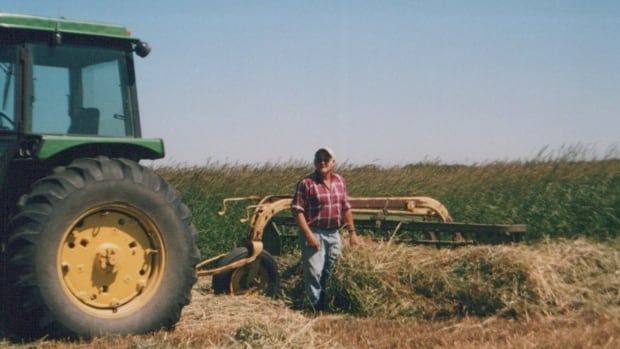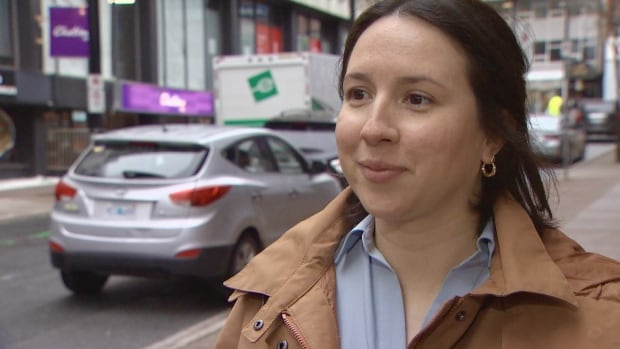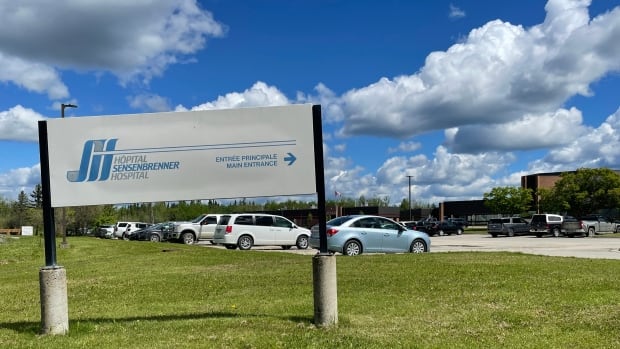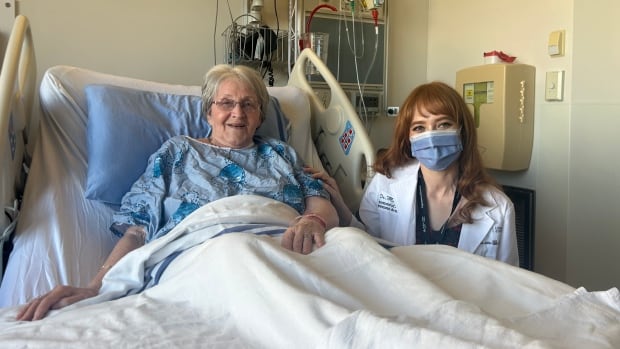This First Person article is written by Becky Zimmer, an agricultural journalist who lives in Humboldt, Sask. For more information about First Person stories, see the FAQ.
When my husband and I cleaned out my mom’s house after she died, I also found many of my father’s belongings. After 11 years as a widow, Mom had still held onto his clothes, the contents of his woodworking shop and even the contents of his wallet, which were all stuffed in the back of a drawer, but I never asked why.
But it was the sight of the top drawer of Dad’s dresser full of tensor bandages and a few finger splints — a familiar sight on him growing up — that made me laugh and reminisce as we emptied it for the final time. Those defined my father — a person who wrapped up all his wounds and pain and kept on going with life as a grain and pig farmer in rural Saskatchewan.
I moved away from the family farm when I turned 18 but still consider myself a farm girl.
While it was one of the best childhoods I could ever ask for, there are a few things I’ve had to unlearn in adulthood.
Dad and his family went through a lot to establish a farm and raise their family on the Prairies, and that meant working without a social security net, readily available medical help and being at the mercy of the weather and commodity prices. I understand and respect where my father got his work ethic.
When I was younger, I enjoyed being in the barn and working with the pigs, especially since that meant sharing Dad’s passion for farming. However, with three older and stronger brothers, he often told my sister and me to help Mom with the household chores instead.

That stung because it made me feel I wasn’t strong or good enough to work on the farm. I was only involved in the evening chores of feeding the pigs and cleaning the pens when my older siblings had left the farm to pursue their own lives and Dad was busy with other things.
Dad was always the stoic farmer and God only knows how many times he bandaged himself up and kept on working. I was only a few months old when he fell in the barn and got a serious concussion. I remember Mom talking about how scared she was watching my uncle help him across the yard and into the house.
If his symptoms weren’t so severe, I doubt he would have stopped working. He lived by the “pull yourself up by your bootstraps” attitude and pushed himself in this way in all aspects of his life.
When Dad broke his ankle during a hockey game, he taped up his skates to continue playing. When he broke his collarbone and couldn’t hold the hockey stick, he taped it to his glove to keep playing. His defence of his actions was that he didn’t know it was broken. These were the stories we’d laugh at and glorify as kids.
Our family’s history of farmers with missing fingers has also garnered a laugh or two. These stories also drove me to try to be tougher and stronger.

That’s why I finished a volleyball tournament on a sprained ankle and even went to a high school dance afterwards. When Dad suggested I should take it easy and let my ankle heal, I threw the stories of his hockey “triumphs” while injured back at him. I could see from the look in his eyes that he realized he didn’t have a leg — or more precisely an ankle — to stand on.
Whether it was pride or concern for the daughter he raised, I’ll never know.
Dad had cardiac issues for years and had a stent placed in his heart just six weeks before he died of a heart attack in 2009. Still, he kept working until taking his last breath, turning to woodworking and part-time jobs following his retirement from farming.
Dad’s stoic nature is why I report on the challenges and rewards of agriculture in rural Saskatchewan.
I feel a deep connection to my father when I report on grain prices and international markets, agricultural innovations and technology, livestock and soil health, and the challenges of living in rural communities. I hope these are stories Dad would have cared about.

The first farming story I wrote for the Western Producer in 2017 was on mental health and how farmers are starting to realize that this same “suck it up” attitude that I grew up with can be harmful.
Putting those words down and explaining how farmers aren’t alone with their physical and mental stress made me wonder if it might have helped my father when he needed it the most — during times of drought, low commodity prices and the eventual shutdown of most small hog operations in the province.
As part of a series on mental health, a look at the stress, depression, and burnout felt by some Canadian farmers.
Hopefully, other farmers also took notice of the Saskatchewan Farm Stress Line that I mentioned in the article.
More recently, organizations like DoMoreAg as well as other health-care professionals and local clinics are keeping the conversation going with presentations and booths discussing physical and mental health at farm shows in the province.
While there is still a reluctance to talk about mental health, I’m happy to see attitudes among farmers are shifting. But sometimes I wonder what could have happened if Dad hadn’t just wrapped up his own hurt and pain and instead sought help.

I also eventually realized it was time to take care of myself. When I finally met a physiotherapist for the consistent pain I was having with my legs and feet for years, she asked why it had taken me so long to see anyone about it.
“Three brothers and I grew up on a farm,” was all the explanation she needed to understand my hesitation.
By reporting on these issues, I also hope that farmers — and their families — who read these stories also start to take more care of themselves.
Do you have a compelling personal story that can bring understanding or help others? We want to hear from you. Here’s more info on how to pitch to us.








